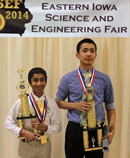
|
|
Maharishi School students take top awards at science fairs Maharishi School students Bimba Shrestha, 11th grade, and Pranav Chhayillil, 7th grade, continue to garner awards in science. At the State Science and Technology Fair of Iowa they won the following awards: Bimba Shrestha: • Overall Senior High Project Champion, $1,200 Pranav Chhalliyil: • 7th Grade Biological Division: 3rd Third Place The Intel ISEF is the world’s largest international pre-college science competition, where 1,600 of the world’s brightest science students from over 70 countries convene in Los Angeles for a week-long celebration of science, technology, engineering, and math. At the event, these young innovators share ideas, showcase cutting-edge research, and compete for more than $4 million in awards and scholarships. Bimba’s research, entitled Save Real Objects as a File, focused on designing affordable 3D scanning technology. He explains, “I looked for ways to bring real objects into the digital world while using the least amount of resources.” Bimba described the process he used to reproduce 3D objects, “First, a normal digital camera takes a video of the object while it rests on a rotating platform. To the side of the camera is mounted a line laser that will shine on the object at a known angle. After one rotation is complete, a computer program that I wrote using Java will export the video from the camera, cut the video into hundreds of frames, and using the known angle will detect where the laser line falls on each frame to create what is known as point cloud. Once the point cloud is created, it can be used to generate a 3D mesh, something that most 3D software support. At this point, the object will have been successfully scanned, and will be available for printing or modifications.” Pranav Chhayillil’s research, entitled The Effect of Bed-time Brushing on Oral Bacterial Count Analyzed Using Quantitative Polymerase Chain Reaction (qPCR) Method, was designed with the intention of bringing “awareness about the importance of bedtime brushing quality on oral hygiene to prevent many deadly diseases and enjoy good health.” Pranav explained, “I used 10 volunteers to eat a Kit Kat at bedtime and asked them to go to bed without brushing for two days and with brushing for the next two days. Their saliva samples were collected the next morning, DNA extracted and PCR analysis was done. Results showed more than 61% decrease in bacterial count in 90% of the samples.” Pranav said, "It was a lot of fun for me. For me, more than winning, I enjoyed meeting kids my age who loved science just like me and it was a lot of fun exchanging knowledge with them. . . . I feel it was a wonderful exposure for me.” Pranav expressed gratitude to the many adults who supported him with his research, “I would like to thank my teacher, Ms. Barbara Hays for giving me the opportunity of doing Science Fair as an honors project and for the project-based education. All my teachers of Maharishi School also laid a strong foundation to get this success. I also would like to thank my parents for always supporting me. Thanks to Genetic ID for technical help.” Also receiving recognition are Gabriel Sperry and Doga Ozsemi, both in 10th grade. The team earned an Honorable Mention Award in Physical Sciences for their research, entitled The Use of Resonant Inductive Coupling for Mid-Range Wireless Energy Transfer. The team received support from Maharishi School science teacher, Karim Nahabet. The team explained their research, “The transfer of electricity wirelessly is increasingly at the forefront of scientific thought and research. Our purpose was to gain a basic understanding of the mechanisms involved in the transfer of electricity wirelessly using resonant inductive coupling. By bringing into tune two different coils we were able to transfer power wirelessly over a short distance and confirmed our hypothesis that more inductance in the transmitting coil will result in better efficiency and range for the system as a whole. In addition we are confident that with more precise tuning, higher voltages, and higher quality coils this technology will find its way into homes as a means to wirelessly power devices.”
© Copyright 2014 Maharishi School of the Age of Enlightenment
|
|

